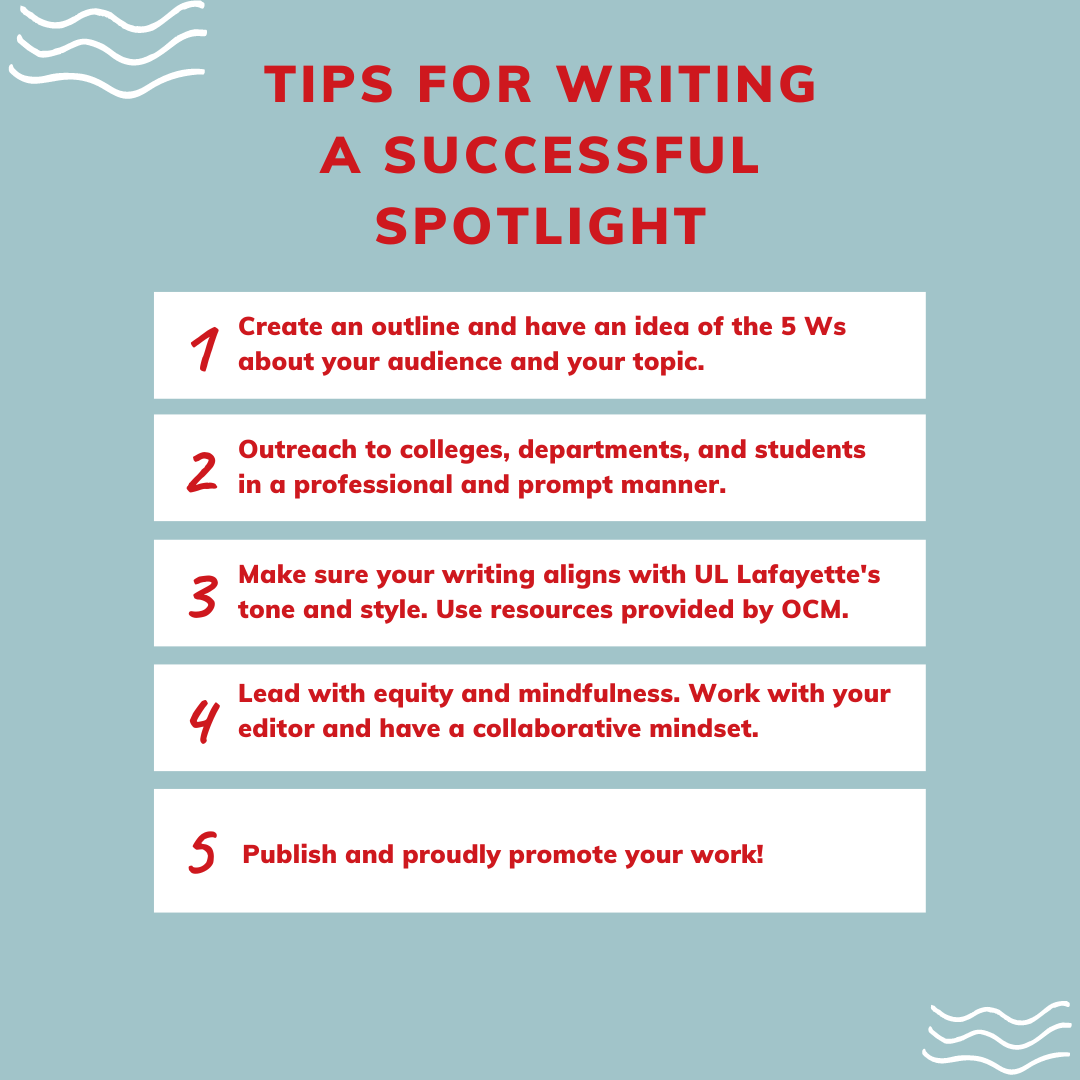Helpful Tips for Writing a Spotlight
The drafting and interviewing process of writing a spotlight can be daunting for some writers. But it is doable and necessary. Our students at the University of Louisiana at Lafayette are accomplishing life-changing goals throughout their academic careers, and deserve to be highlighted as undergraduates, graduates, and alum.
A spotlight is a story highlighting student accomplishments, journey, future, and their experiences at the University. The purpose of the spotlight is to showcase positive student life and their academic career at the University of Louisiana at Lafayette. Spotlight stories are written for prospective students to boost the University to their top choice based on excellent student testimonials and alum outcomes. Read some of our existing spotlights.
Keep in mind that the spotlight stories are about the student and the University building each other up together. Here are a few tips to help beginner and non-beginner writers become confident and stellar at writing student spotlight stories.

Have an idea of your 5 Ws about your audience and your topic
Get to know who you are talking to and be aware of who your audience is while preparing. In the beginning process, discover what topics you will cover in the student spotlight.
Plan and figure out when you will need to contact interviewees for an interview. It is important to be respectful of everyone’s time.
How will you conduct the interview? There are options such as an in-person, zoom, or e-mail interview. The OCM team provides this question template that covers the basics. The template is a foundation to be built on and can be customized to fit the specific student. We encourage follow-up questions as needed.
Make sure to know your why throughout the entire process. Be mindful not to write in a loose or playful manner. As the content writer, you are telling a story about another human being, so be aware of this.
Know who to reach out to get to where you need to be throughout the interviewing and writing process.
Create an outline and gather information
It is important to create an outline to jot down notes and the directions you will take when drafting a spotlight. Do not keep any information in your head, write it down. Keep your outline updated and organized because it will be easier to expand on later. Adding sub-notes to your notes can aid the time it takes to draft your spotlight.
Gather a list of students and/or college departments, programs, and organizations that align with the topic you are writing about. Spotlights can feature students in a particular program, or a part of an organization so know who you are reaching out to. How an interviewer treats interviewees and others throughout their drafting process will reflect in their final drafts.
Contact students and colleagues in a prompt, professional, and respectful manner. Tailor the interview questions specific to the student’s major, minor, and/or affiliate organization(s). While having a header photo is not required, it does elevate the spotlight, so remember to ask the interviewee if they have a professional landscape photo. If they do not, you may submit this form with OCM Creative Services to be connected with our staff photographers.
Align with the style and tone of UL Lafayette
Writing for a public college institution means professionalism is non-negotiable. Be mindful to create a positive and realistic tone while drafting the spotlight. Highlight and center the subject interview and University but do not exaggerate the truth. Be engaging and tactful. Your audience will include students, department faculty and staff, and the greater Louisiana area and beyond, so be mindful.
Resources for following UL Lafayette style and tone:
Lead with a mindset for all
Consider the communities and organizations at the University of Louisiana at Lafayette that have faced historical challenges, and reach out to them in a respectful manner. Keep humanity and fairness at the forefront of your heart and mind. Understand the reality of our society and uplift those doing excellent work.
Have a collaborative mindset
Throughout the entire process you, as the writer, will collaborate with multiple people. Have clear communication, be open-minded, and willing to learn and discuss. Presenting these skills will create an easy-flowing process while interviewing and drafting.
The editor is your best friend, not your enemy. Share ideas and suggestions with your editor and gracefully receive the constructive feedback they offer. The editor is there with a fresh perspective to help your story be presentable and readable to the public, so keep this in mind.
Lastly, publish and proudly promote your work. This is the step that writers tend to lag on. You spent weeks preparing and drafting a phenomenal story so share it with your network of people.


